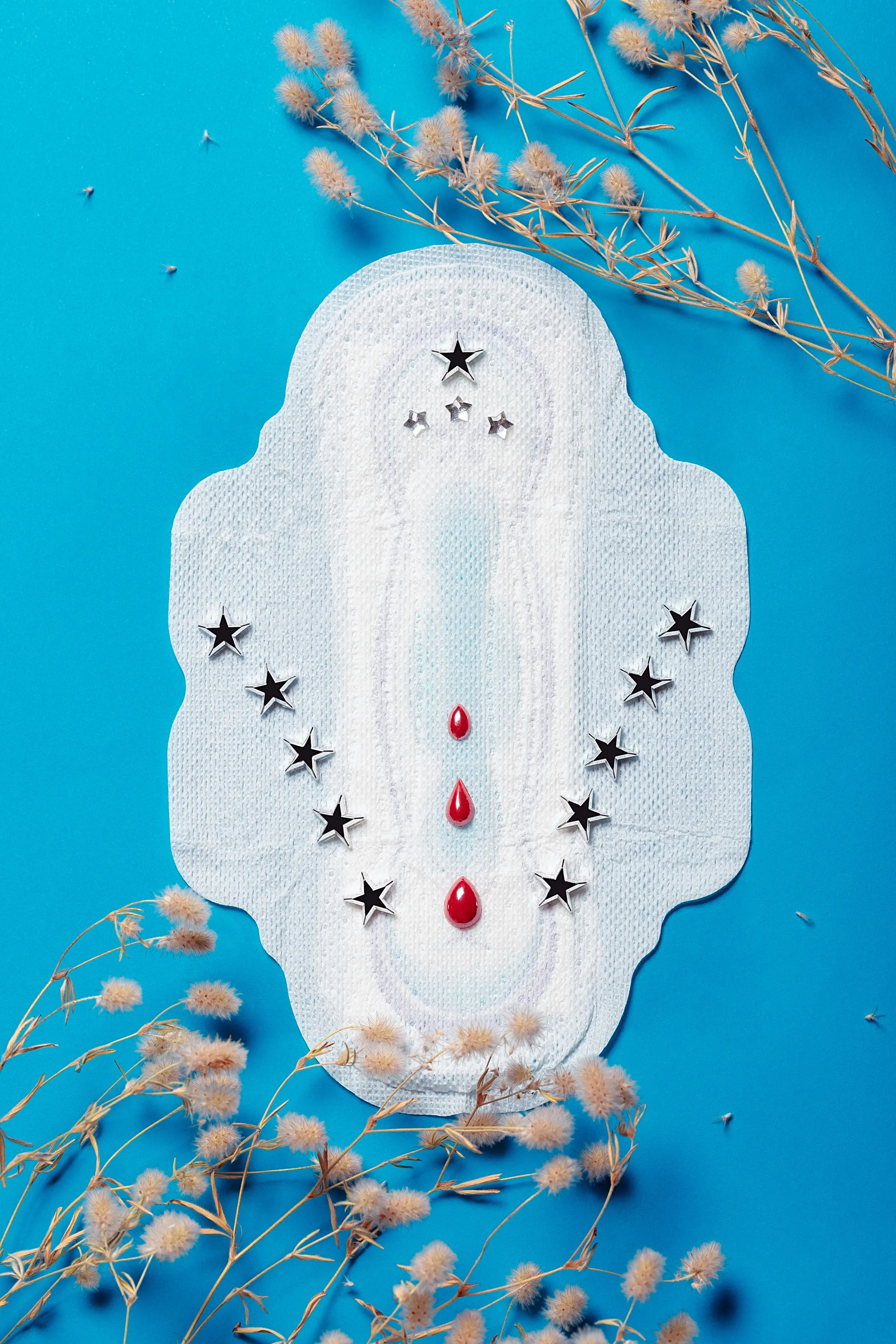If you haven’t picked up on last week’s article, make sure you take a peek, because I revelead the most under looked factors that crucially impact mental health struggles in women.
Spoiler alert: our menstrual cycle.
Today I want to show you, with real-life examples, what happens to our mental health when we ignore our hormonal cycles and natural hormonal rhythms.
Plus, how the consequences of this behavior are deeply connected with:
--> lower quality of life,
--> less satisfaction with your life
--> poor performance at work,
--> daily anxiety, a tendency for depression, and negative rumination.
Why you should care about healing hormonal imbalances instead of normalizing them
The consistent repetitive action of not being attentive to our menstrual cycle needs, and choosing to continue with actions that don’t support the ebbs and flows of our hormone fluctuations, starts showing up as hormonal imbalances in women.
In the beginning, these imbalances can look like this:
🟣 a little more fatigue as we’re getting closer to our periods,
🟣 cramps that are light but still annoying,
🟣 some irritability and lack of focus,
🟣 and perhaps a pimple here and there.
Doesn’t look like anything major right?
"Just life happening..." right?
But as life progresses, and as we normalize these initial warning symptoms and brush them under the carpet, the hormonal imbalances that these symptoms represend don’t simply disappear or stay the same.
A rotten apple can spoil the whole barrel.
That’s what happens when one small problem in your body goes unseen.
- This is why it’s so crucial, that as a society we stop normalizing pain.
The downfall of normalizing pain
It’s scary how comfortable we’ve gotten at normalizing women’s suffering.
So, I want you to start interpreting your symptoms, even the little ones, as loud messages your body wants you to hear.
All your body is trying to tell you is that something is wrong and you need to look at it, that's why it's giving you pain or discomfort because it's the only way you'll look at it.
So, the first paradigm we need to shift as women (and as humans) is:
🟣Symptoms shouldn’t be feared.
They should be welcomed and appreciated.
Because when you became aware something is off, you can then intentionally start looking at WHY it is happening and what is the most suitable solution.
I personally have the practice of thanking my body when it shows me an uncomfortable feeling.
Without uncomfortable symptoms, we would never be able to stop the problem in time.
Unfortunately, because the normalization of pain is so ingrained in our culture, we brush these initial messages aside and later on our bodies get into an even bigger chaotic mess (chronic disease).
When it rains it pours.
Here’s how period/menstrual problems, also known as hormonal imbalances, can directly and indirectly start affecting your quality of life and result in different mental health struggles:
🟣 Physically
Physically, women with hormonal imbalances have their lives impacted with weeks of pre-menstrual problems such as intense fatigue, acne, uncontrolable cravings and weight gain, unexplainable mood swings. They may also experience unpredictable hot flashes and night sweats, loss of libido and hair loss.
All these physical symptons not only affect their sexual health, confidence, and love for their bodies, but they all emphasize their feelings of low self-esteem.
Constantly not feeling like yourself, eventually exaust even the happiest person on the planet. If you feel like you're constantly swimming against the tide, keeping a positive and hopeful outlook of life becomes another "task" on our to-do list.
🟣 Mentally (at work and at home)
Mentally speaking, women with hormonal imbalances may experience having trouble concentrating, remembering things, and making decisions. They may consequently lose confidence and stamina in their performance at work, start doubting their capabilites and quickly fall into the anxious and depressive thoughts. This can affect their career growth and belief in themselves.
Work life is often the first place in women's life where she experiences the negative consequences of hormonal imbalances, by bringing big feelings of low self-esteem up and "not feeling good enough", and eventually it catches up to their personal life where they experience more irritability towards the closest people in their life, as well as conflicts with colleagues and peers.
At home, they may also struggle with overwhelm to make healthy meals, keep the house tidy, and taking care of the kids, as they already feel physically and emotionally exhausted from overconseonsation from feeling of inadequacy at work. This can lead to more feelings of guilt and inadequacy and disconnect them further from their partners and family.
🟣 Emotionally
The emotional burden that comes with the consequences of hormonal imbalances is the most challenging mountain anyone can ever climb. Because there is no end. It's an ever growing amount of frustration, overwhelm, and hopelessness that get's added on to the top as each days goes by.
Women often feel like they have lost control over their bodies and their lives, and that their bodies are at war. No one can ever imagine how brutal this feels like until they've been through it. Which is why womne get so frequernly dismissed by their practioners and often partners and family.
Social isolation and loneliness is a serious and growing consequence for women who never feel understood or taken seriously with their health issues.
🟣 At the gym
At the gym, women with hormonal imbalances may struggle to maintain a regular exercise routine due to excessive fatigue and lack of motivation. They may also experience difficulty losing weight or building muscle, even though they are giving it their all, which can pile on their low self-esteem and self-worth. This can lead to extreme feelings of sadness and hopelessness, leading to self-sabotage behaviours such as over-eating, drinking too much, satying up late scrolling on social media instead of having a restful night, etc.
🟣 On vacation
On vacation, women struggling with hormonal imbalances may struggle to enjoy themselves fully due to physical discomfort. Instead of resting and enjoying life, they feel emotional distress about their bodies which stops them from resting and relaxing.
They may also feel hesitant to participate in activities they would otherwise enjoy, and create further isolation and guilt.
How to make sure your mental health is strong every year that goes by.
Here’s the moral of the story:
Something as simple as cramping while you’re on your period, should never be normalized and left unfixed.
Because when we do that, it can quickly escalate to deep-rooted systemic hormone imbalances, that can alter women’s life experiences in a devastating way as I described above.
No matter what the symptom is, resolve it as soon as you start feeling it because a woman’s mental health is directly related to her understanding of her body and her understanding of how her menstrual cycle should feel like.
With that being said, the journey of self-discovery of your female body is not meant to be quick and easy. It’s a slow, pleasurable life-long progress that you will embark on.
But every year of that journey, the fruits will be plenty and sweet, not just physically but also emotionally and spiritually.
- You will get to know and appreciate yourself and your body deeply (when was the last time you've ever felt this way?).
- You wil bring forward parts of yourself you didn’t even know were there because you'll no longer be an auto-pilot exausthed mess.
- You will connect back to the magic of the feminine energy we’ve suppressed for millennia.
- And you will attract people who elevate you and support you in this journey.
Believe it or not, this plays a huge role in your body’s capability of healing from:
🟣 hormonal imbalances that are giving you nightmare headaches, PMS for 2 weeks staright, and depression
🟣 systemic inflammation that is aging you fast, keeping your brain numb and slow, affecting your sleep, digestion, and immune function, all of which play an important role in keeping your hormones balanced.
Give yourself permission
If all this sounds overwhelming, I get it - is it because we're starting to onboard a new way of thinking - a new paradigm.
There’s a lot to learn and unlearn...and a lot to implement.
So give yourself a permission slip to ask for help! (we’re terrible at doing it).
Get support from a professional, a coach, or a specialist that can guide you with the exact steps you can take to start removing overwhelm off your plate.
Nothing feels better than feeling supported in your day-to-day, knowing that at any moment you can ask for help when challenges come up, and that you're no longer alone in this journey of feeling powerful back in your body!
The added benefit of asking for help and feeling supported is that it lowers your stress hormone – cortisol – which is one of the reasons why you could be having irregular and painful periods. Just that step could change your entire experience with your menstrual cycle.
Needing to prove that you can do everything yourself, is only a societal construct, put in place to keep you small and easily manipulated by outside values that do not serve your greatest self. Never forget that!
Much love,
Dr. Maria Tedim – Your go-to doc for happy hormones
Resources:
Vitti, A. 2020, Flo Living, HarperCollins, New York.
McEwen B. Estrogen actions throughout the brain. Recent Prog Horm Res. 2002;57:357–84.
Reynolds TA, Makhanova A, Marcinkowska UM, Jasienska G, McNulty JK, Eckel LA, et al. Progesterone and women’s anxiety across the menstrual cycle. Horm Behav. 2018 Jun;102:34–40.
Wharton W, Gleason CE, Olson SRMS, Carlsson CM, Asthana S. Neurobiological Underpinnings of the Estrogen – Mood Relationship. Curr Psychiatry Rev. 2012 Aug 1;8(3):247–56.
Vitti, A. 2013, WomanCode, HarperOne, New York.
What you can read next...

